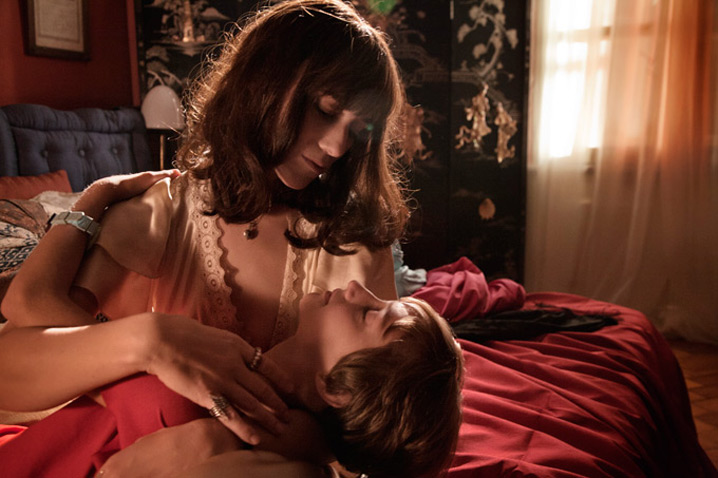
There’s something irresistibly hip about Asia Argento, even as a concept. The sultry, pouty daughter of trash-horror maestro Dario Argento, her public image as a wild child jack-of-all-trades-as-long-as-they’re-kinda-glamorous (actress, singer, model, director) does make her something of a poster girl for tough, troubled, attitude-y cool (just check out her Cannes red carpet pic or her Twitter account for that matter). But after her first two forays into directing, “Scarlet Diva” (in which she also starred as a self-destructive starlet) and child abuse chronicle “The Heart is Deceitful Above All Things,” she has shifted gears in several ways with her third: she makes a brief, Hitchcock-level cameo but doesn’t star, and most welcome, she moves from straight-up miserablism to a beguiling cockeyed whimsy.

However “Misunderstood” (“Incompresa“), which played in the Un Certain Regard sidebar in Cannes, is unavoidably personal too. The lead 9-year-old is called Aria, Argento’s own original name; Aria’s father is famous and in the movie business; and Aria’s parents separate at around the same time in her life that Asia’s did. But the tone Argento establishes is more quirky than realist, a kind of heightened, played-up filter—reflected in the slightly oversaturated palette—that keeps proceedings, for the most part, gently ironic enough to not take themselves too seriously, even when her young central character does.
At the film’s opening, Aria (Giulia Salerno, possessor of the biggest, bluest eyes of all time) lives with her mother (perfectly cast Charlotte Gainsbourg), a successful concert pianist, and hyper-superstitious father (Gabriel Garko), a famous, bronzed movie star who yearns to do a serious art film. She has two half-sisters: Lucrezia, (Carolina Poccioni) the plump, pink-obsessed elder child of her father’s, and Donatina (Anna Lou Castoldi), her mother’s elder daughter by another man. This distictly non-nuclear arrangement should put Aria at the center of this new family unit, but in fact, the relationship between her parents is already on the outs, and more often she is neglected as they lavish more attention on their “own” kids. When they do break up finally, Aria pings between the two of them—whenever she becomes an inconvenience to one she’s sent to the other—but this lack of stability is somewhat lessened by the steadfast affections of Dac, the black cat she adopts, and of her best friend Angelica (Alice Pea), with whom she’s so close they frequently declare that they are the same person and refer to each other by the same pet name.

The film captures the passionate quality of early female friendship very well: there’s a lot of giggling and prank calling and in jokes and endless declarations of the undying nature of their attachment (foreshadowing, of course, its inevitable death). And its evocation of the casual neglect and occasional active cruelty of Aria’s parents toward her, the push-pull of affection and revulsion she represents as the product of a relationship gone so spectacularly sour between inherently narcissistic people, is unexpectedly affecting (shades of “What Maisie Knew“). But best of all is when Aria is not just a piece of clay molded and shaped by her specific set of circumstances, and is an engaging, contradictory, rounded character in her own right. The respect that the film mostly has for Aria’s personhood, even at such a young age, gives it a keener edge than many other entries in the rather overpopulated coming-of-age genre.

Away from the parental and best friend dynamics, however, the film loses a little of its sharpness and focus. The generically mean Mean Girls at school feel overfamiliar in their bully tactics—there’s even a game at a party that Aria throws that plays out almost exactly like the “seven minutes of heaven” bit in “13 Going On 30.” And her crush on golden-haired skateboarder Adriano (Andrea Pittorino), a pre-teen version of the kind of heartbreaker her father is, feels underdeveloped, a little like her interactions with her half-sisters—the comically evil, indulged Lucrezia and the nicer but more colorless Donatina. In the sketchy, shorthand versions of these characters, we start to feel more strongly that the film in fact does have an agenda to make us feel for Aria’s plight as though she were nothing but a victim of the meanness around her, as opposed to the mischievous, resilient, un-self-pitying creature of earlier.

This unwelcome self-serving note, introduced only late on, reaches a crescendo in the very last lines of the film. Over a shot of Aria looking straight into camera with those enormous, vivid, cornflower eyes her voice intones, “I tell you all this not to make you feel sorry for me, but just so you will understand me better. And maybe, be a little bit nicer,” which feels so on the nose it undoes a lot of the film’s good work in keeping Aria’s story her own, as distinct from Argento’s (and this despite the pains Argento takes in interviews to separate the two).
Ironically, the inclusion of that “poor me” moment is one of the things that makes us less inclined to be “nicer”; if it simply wasn’t there, especially as the very ending, we’d have liked the film quite a bit more. Argento may have a very interesting background and may a lot of the time feel, as the title suggests, misunderstood, but “Misunderstood” is a stronger film when it’s being, as it mostly is, fresh, fond and blackly funny, with no ulterior motive save to tell the story of this little girl. Pushed into independence too young, and stumbling along the path toward the person she’s going to become, we don’t need to be asked to empathize with Aria, we’re already there. [B]
Browse through all our coverage of the 2014 Cannes Film Festival by clicking here.






